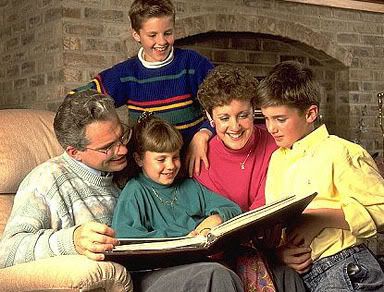Parents and other family members need to be involved in children's reading throughout their school years. Schools recognize the importance of parent involvement in students' progress and are increasingly encouraging parents to play a more active role.

Below are a few simple things that parents can do to create a healthy reading environment.
Make Reading Materials Available
To create a healthy reading environment, start with a good supply of reading materials—newspapers, magazines, books, and catalogs. It doesn't matter if they're owned or borrowed, new or used. What's important is that reading materials are a natural part of your home and everyday life. Set aside a spot in your home for a family library. You don't need much space; a corner of a room with a bookshelf, comfortable furniture, and adequate lighting will do. In choosing materials, remember that variety counts. Instead of focusing on the number of books, keep in mind the interests of each family member. A small collection of books thoughtfully gathered over time is better than a large collection that goes unread. Paperback and hardcover books, a dictionary, an atlas, songbooks, magazines for parents and kids, newspapers, and catalogs all have a place. Make sure your library includes something for everyone at every reading level.
Make books inviting to everyone. Sturdy bookcases, built-in shelves, and open magazine racks are ideal, but an orange crate works too. Be sure to put reading material for youngest readers on the lowest shelves.
Be Reading Role Models
As much as they may deny it, most children want to be like their parents. Their lifelong habits start to form at the earliest ages, often by mimicking older members of the family. If they see you reading daily—both for function and for pleasure—they will more likely become avid readers themselves. If children see parents visiting libraries and checking out books, giving and receiving books as gifts, and borrowing and loaning books to friends, they will know their parents place a high value on reading.
Read Aloud to Children
Reading to children, even for a few minutes each day, prepares them to read and encourages a positive attitude toward reading. Children who are read to at home learn to read more easily, have a higher vocabulary, and are more likely to develop a love for reading than those who are not read to on a regular basis. Simply put, this cannot be done too early or too often.
Encourage Personal Libraries
Children often want their own place to keep books that have special meaning for them. By encouraging children to set aside their personal favorites, you are helping them express their affection and respect for books. Here are some tips for helping children set up collections:
- Find a special place for books. If your child's room doesn't have a bookshelf or bookcase, use a box, basket, or other sturdy container. Plastic stacking cubes work well.
- As often as possible, let your children choose the books they want to add to their collection. A book-buying trip to a yard sale or bookstore is a fun Saturday activity.
- Take your children to the library regularly. Even a child with a well-stocked bookshelf needs a fresh supply of books. Encourage children to treat library books with the same care they show their own.
- Give your children books or magazine subscriptions as gifts.
- For babies and young toddlers, choose sturdy books that will survive rough handling. Board books, for example, have thick pages that can be turned easily and wiped clean.
For generations, education experts have been sounding the alarm about the harmful effects of too much television. The rise in popularity of the Internet and computer and video games only adds to the din of distractions pulling children away from more literary pursuits. While excellent educational programs and software exist, consumption of electronic media must be kept in check by parents. Limit children's television and computer use to make time for other activities, such as reading. Try not to use television and computers as rewards for reading (or denying them as punishment for not).
Source: RIF Motivational Activities Handbook



0 comments:
Post a Comment